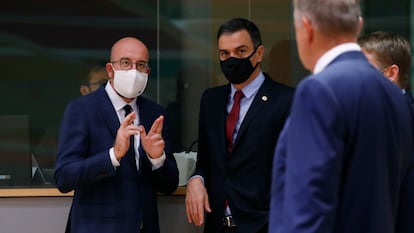Spain to get €140 billion from historic EU coronavirus recovery fund
The country becomes the second biggest recipient of aid after Italy, and €72.2 billion will take the form of grants that do not have to be repaid

Spain will receive close to €140 billion over the next six years from a €750 billion coronavirus recovery fund that the 27 members of the European Union agreed on in the early hours of Tuesday following a marathon summit in Brussels.
The EU fund involves €390 billion in grants and €360 billion in low-interest loans. For the first time in EU history, the bloc will borrow collectively on the international markets to finance the stimulus plan.
There is no doubt that today, one of the most brilliant pages in EU history has been writtenSpanish PM Pedro Sánchez
The amount allocated to Spain is the equivalent of 11.2% of the country’s gross national product (GDP) in 2019, and it makes Spain the second biggest recipient after Italy.
The lion’s share of the money is going to the countries worst hit by the Covid-19 pandemic. Spain, which has an official death tally of over 28,400 and whose economy is expected to contract 10% this year, will receive €72.7 billion in grants and the rest in loans.
Prime Minister Pedro Sánchez praised the deal as a “great” agreement for Europe and for Spain. “There is no doubt that today, one of the most brilliant pages in EU history has been written,” said the leader of the Spanish Socialist Party (PSOE) at a news conference following the landmark deal.
Economy Minister Nadia Calviño added that “new resources will be mobilized to foment recovery and to reorientate our economy towards a more inclusive and sustainable kind of growth.”
Sánchez, who heads a minority government in coalition with the leftist Unidas Podemos, said he is “95% satisfied” with the deal because Spain is getting the €140 billion package it had been pushing for, and will only see a reduction in grants from the original target of €77 billion to the final figure of €72.2 billion.
The Spanish leader said that €72.2 billion over six years is nearly 10 times as much as Spain received over the same period in EU cohesion funds, which allocate money to reduce regional disparities.
Strings attached?
But Sánchez did not provide details about the conditions that might come with the release of funds, particularly on sensitive issues such as labor reform and the pension system. Regarding other EU members’ faith in Spain’s ability or willingness to undertake reforms, Sánchez insisted that “the agenda of the Spanish government is aligned with that of the European Commission.”
As a concession to the “frugal” countries who had balked at the idea of handing out grants instead of loans, part of the deal reached in Brussels involves recipients sending in a plan detailing how the funds will be spent. Spanish government sources earlier this week admitted that the money was likely to come with conditions that could affect the Spanish executive’s pledge to repeal all or parts of a controversial labor reform introduced in 2012 by the conservative administration of Mariano Rajoy, and which introduced more flexibility in the job market.
English version by Susana Urra.
Tu suscripción se está usando en otro dispositivo
¿Quieres añadir otro usuario a tu suscripción?
Si continúas leyendo en este dispositivo, no se podrá leer en el otro.
FlechaTu suscripción se está usando en otro dispositivo y solo puedes acceder a EL PAÍS desde un dispositivo a la vez.
Si quieres compartir tu cuenta, cambia tu suscripción a la modalidad Premium, así podrás añadir otro usuario. Cada uno accederá con su propia cuenta de email, lo que os permitirá personalizar vuestra experiencia en EL PAÍS.
¿Tienes una suscripción de empresa? Accede aquí para contratar más cuentas.
En el caso de no saber quién está usando tu cuenta, te recomendamos cambiar tu contraseña aquí.
Si decides continuar compartiendo tu cuenta, este mensaje se mostrará en tu dispositivo y en el de la otra persona que está usando tu cuenta de forma indefinida, afectando a tu experiencia de lectura. Puedes consultar aquí los términos y condiciones de la suscripción digital.








































